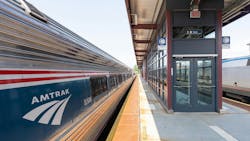MassDOT releases new study focused on riders’ experience with its transit systems
The Massachusetts Department of Transportation (MassDOT) released a new, community-based participatory study, the People and Transportation Project Report, focused on the lived experiences of residents using the transportation system in the Springfield region.
“We are proud to release the People and Transportation Project Report, created through the partnership of MassDOT, Way Finders, and The MassINC Polling Group,” said Massachusetts Transportation Secretary and CEO Monica Tibbits-Nutt. “This report is about more than data. It is about listening to the voices of our neighbors, understanding the challenges they face and acting on what we learn. By uncovering both the barriers and the opportunities, we can build a transportation system that is more affordable, reliable and accessible. This work is about creating a system that truly supports low-income families and people with disabilities in western Massachusetts so they can connect to the opportunities and experiences they deserve.”
To carry out the project, MassDOT worked with The MassINC Polling Group (MPG), a public opinion research firm based in Boston and Northampton, and Way Finders, a nonprofit community development corporation headquartered in Springfield. Together, they surveyed over 1,600 Way Finders clients and held eight focus groups. MPG also ran a separate survey of 600 residents of Hampden and Hampshire counties making less than $75,000 per year. The agency says Way Finders staff played a key role in every step of the project, from helping to design and lead focus groups through writing the survey, sharing it with clients and analyzing the results.
“Transportation has been an ongoing challenge for our clients in Western Mass for a long time,” said Way Finders President and CEO Keith Fairey, “This study is important because it includes direct input from our clients. Their voices were critical to the study’s findings.”
The agency says that perhaps the most striking finding of the research is how much the cost of transportation is weighing on these lower-income residents. About half (49%) of low-income residents in Hampden and Hampshire counties in Western Massachusetts report that their monthly transportation expenses are a burden. Among those getting help from Way Finders, that number rises to 80%. Nearly half (49%) of Way Finders’ clients say their transportation costs are a “very big burden.” A majority (62%) of Way Finders’ clients say they have missed paying other bills due to the cost of transportation, and 75% have been unable to afford to get where they needed to be.
The report also found:
- Driving is the dominant travel mode in both surveys. Way Finders’ clients are much more likely to have only one car, and most say they could not afford a major repair or borrow another car if needed.
- More than 80% of Way Finders’ clients have been negatively affected by problems with transportation, including being late for or missing appointments (54%), being late for work or school (36%), skipping medical care (31%) and being stranded somewhere (25%).
- Getting to Boston is a particular challenge for people in both surveys, especially for medical appointments. Most people in both surveys say they would be likely to ride West-East Rail to Boston.
- Most people in both surveys support continuing fare free service on the Pioneer Valley Transit Authority (PVTA), and most of Way Finders’ clients say that fare-free buses would make them likely to ride more than they do now.
MassDOT will use the findings to help plan transportation projects that better meet community needs. Way Finders will use the data to better understand the transportation challenges its clients face and improve its services to help them overcome barriers to economic opportunity.
The Healey-Driscoll Administration and MassDOT say they continue to address transportation accessibility and affordability in Western Massachusetts. Through the fiscal year 2026 budget, fare free regional transit service will be extended at all 15 Regional Transit Authorities, including the PVTA. MassDOT is working to advance Compass Rail, a vision for intercity passenger rail connections utilizing existing services and new connections between the western and eastern Massachusetts, including West-East Rail.
The Healey-Driscoll Administration says it also delivered an all-time high of $300 million in Chapter 90 funding for cities and towns to make repairs and improvements to local roads, bridges, sidewalks and culverts. This funding includes a new formula that will allow for $100 million of the total investment to be allocated based exclusively on road miles, which will benefit small and rural communities statewide.
